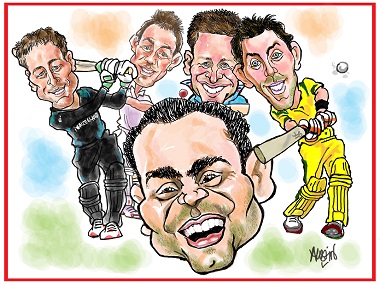“Lagta hai kal raat party der tak chali,” says Virender Sehwag in a Kings XI Punjab (KXIP) related commercial on TV. “Chalo,” he gives a call to the driver of the team bus — in mock annoyance — to leave for the ground as his overseas stars fail to report on time.
On 14 May, at Pune, after failing to make it to the playoffs of IPL 2017, he looked a tad more than annoyed at the overseas batsmen for letting KXIP down in a vital game. They had had an outside chance of making it to the playoffs, if they had won, with Rising Pune Supergiant (RPS), Kolkata Knight Riders (KKR) and KXIP then finishing with 16 points each.
Seventy-three all out in 15.5 overs was no fighting total, even on a sluggish track. And rightly, the Pune batsmen made light work of it, chasing the score down in 12 overs, thus taking second position on the league table behind the Mumbai Indians (MI).
At a presser after the match, Sehwag, who is chief of cricket operations for KXIP, castigated Glenn Maxwell, along with Eoin Morgan, Martin Guptill and Shaun Marsh for their meek surrender in a pressure game. Not known to mince words, he said that he had expected the more experienced foreign players to play for a major part of the 20 overs and not leave it to their inexperienced Indian counterparts to fight it out.
Franchises don’t depend on overseas batsmen anymore
The ‘Nawab of Najafgarh’ may have said this in a moment of despair but then he could have handled things a little more sensitively. His overseas batsmen — including Hashim Amla (420 runs in 10 matches), Maxwell (310 runs in 14 matches) and Marsh (264 runs in 9 matches) — had served the team well till then. The Indian batsmen closest to them in KXIP were Wriddhiman Saha (234 from 14 matches), Manan Vora (229 from 11 matches) and Axar Patel (227 from 14 matches).
A glance at the performances of Indian batsmen in IPL 2017, from the four teams that qualified for the playoffs, dispels the myth that franchises have to depend on their foreign recruits to win matches for them any longer. MI’s top five batsmen, for instance, included Parthiv Patel, Nitish Rana and Rohit Sharma, along with Kieron Pollard and Jos Buttler.
For the Pune outfit, Rahul Tripathi, Ajinkya Rahane and Manoj Tiwary were up there with Steve Smith and Ben Stokes. Gautam Gambhir, Manish Pandey and Robin Uthappa have dominated the batting for KKR this season, and for the Hyderabad franchise, besides David Warner, Moises Henriques and Kane Williamson, Shikhar Dhawan and Yuvraj Singh have made big contributions.
Out of the 20 top performing batsmen in IPL 2017, before the playoffs, 13 were Indians! Therefore, KXIP, to start with, had their priorities wrong at the auction table and could perhaps have done with better strategies at matches. ‘See the ball, hit the ball’ was Sehwag’s batting philosophy. In that sense, his batsmen did not do much wrong!
Virender Sehwag, who has won the hearts of millions of fans with his witty tweets, could perhaps have used a bit of humour to get his message across. Overseas players — like it or lump it — are an essential ingredient of IPL’s business model and are one of the reasons for its huge success.
Now, Sehwag has the right to express his frustration in public — whether in the heat of the moment or not. What was uncalled for, however, was the reaction of his fans on social media. Some tweeps even went to the extent of labelling foreign players in IPL as ‘mercenaries’. These extreme reactions reek of arrogance and that is one reason why players, coaches and administrators have to be careful about what they say to their followers.
Sensitive times for Indian cricket
These are sensitive times for Indian cricket. The game is now run by an ad hoc committee on the recommendations of the Lodha Commission. This happened following charges of large-scale corruption, betting and match-fixing — besides power-games being played. The BCCI bosses had money and power, just the ingredients required for corruption, and more importantly, arrogance!
Indian cricket now needs to be handled more sympathetically in every way. There can be no place for haughtiness in either its administration or in its conduct.
Take for instance the revenue-sharing fiasco at the ICC level: The cricket crazy country contributes around two-thirds of the revenues that the International Cricket Conference (ICC) generates. Yet, when it came to getting a bigger pie in the revenue-sharing model of ICC recently, the proposal was shot down by 9 votes to 1. One may view those who ditched India on this issue as ‘green-eyed monsters’ but then the fact remains that a more sensitive handling of India’s concerns could have served BCCI’s cause better.
Is IPL being blackballed?
It was reported recently that Cricket Australia (CA), in all its wisdom, has offered some of their best players bigger three-year contracts to woo them away from the IPL. These players include Steve Smith, David Warner, Mitchell Starc, Josh Hazlewood and Pat Cummins. Former Australian skipper, Michael Clarke however felt that it would be difficult for CA to entice players with bigger contracts because they enjoy the atmosphere at IPL matches. But one never knows.
Australian players are a force to reckon with in IPL and an exodus, for any reason, could hurt the event massively. There were 37 of them on the auctions list for IPL 2017. There are also three coaches from Down Under in the IPL and quite a few on the support staff of various franchises.
Cricketers Down Under are already at loggerheads with their association for fatter pay-packets and better terms of contract. Darren Lehmann, the Australian coach felt that the issues would soon be resolved and that the imbroglio would not affect the Ashes series this Australian summer.
During IPL 2017, a few players from England too believed that they would be better off playing on the County circuit rather than warming their butts on IPL benches. Jason Roy, one of the most exciting players in the Gujarat Lions’ line up preferred to leave early and play matches for Surrey. Andrew Strauss, England’s director of cricket, considers managing the workload of England players was important because of the ensuing Champions Trophy, followed by seven Tests and a busy winter in Australia and New Zealand.
The Pakistan cricket Board has made it clear that none of their players would participate in the IPL until Indo-Pak ties get better, politically. Of course, franchises would prefer it that way because of issues related to holding matches in certain cities opposed to players from across the border.
Players from Australia, England, South Africa, New Zealand, the West Indies Sri Lanka and Bangladesh have brought in the overseas glamour to IPL. The best international players taking part in the 45-day event has brought in the crowds, the TV channels and with it the dough. Just imagine an IPL season with only Indian players in the line ups, and you will know why being sensitive to the needs of international cricket will be to India’s advantage.
Phase II of IPL will need re-engineering
Phase I of IPL was a 10-year plan, which ends this May. The T20 event has become popular, and grown beyond recognition during this decade because it was built around a well thought out business model. It has also made most people involved with the game richer than they would ever have dreamed of during one lifetime.
While drawing up plans for the next five years of IPL – Phase II – the various powers that be will do well to plan ahead for all kinds of contingencies, including a possible blackballing of the event by vested interests.
Overseas players involved in different franchises would naturally look for more participation and greater responsibility in future. Rules possibly could be tweaked to make this possible. IPL has unearthed some great domestic talent over the years but franchises would do well to work more at the grass root level to create and nurture talent. A thought could also be given to the comforts that should be provided to the paying customer.
And finally, those in charge of Indian cricket will also do well to rid Indian cricket of ‘arrogance’ and deal with day-to-day cricketing issues with a much greater sensitivity!
The author is a former fast bowler, writer, caricaturist and mental toughness trainer.


)




)
)
)
)
)
)
)
)